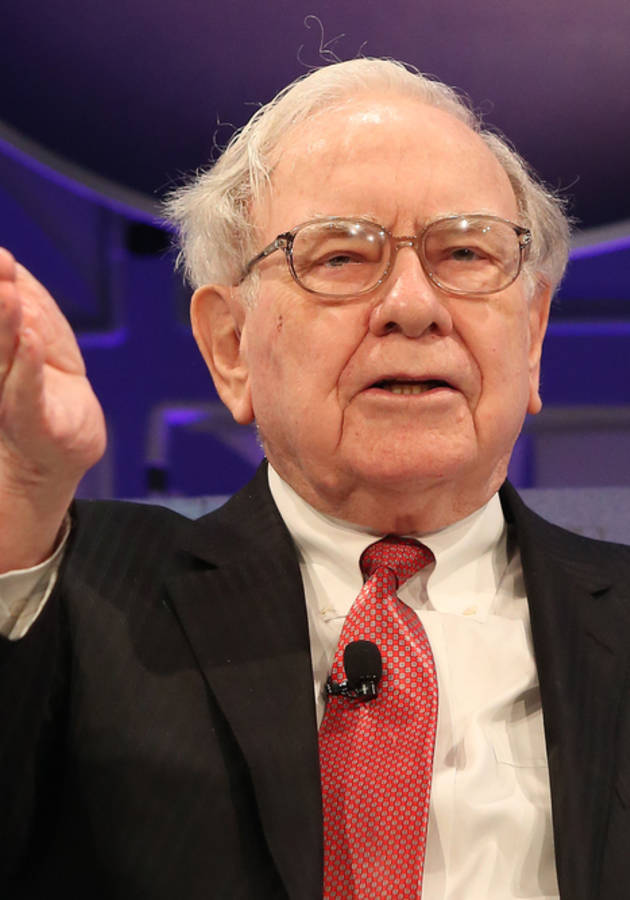Warren Buffet is a household name all over the world. One of the wealthiest men in existence, he built his fortune on Wall Street making countless successful investments. Since Warren Buffett took over Berkshire Hathaway, Equity Ratio has risen from $ 19.46 to $ 20,000 (in 1998). That equates to a compound growth rate of 23.8% per annum! What is Warren Buffet's secret? How could he have made Berkshire grow so much? In this piece, Warren Buffet shares with all its shareholders all aspects of Berkshire business that helped him get there! If you want to find out how Warren Buffet works, come with the 12min team!
The Berkshire Hathaway Business Principles
At Berkshire Hathaway shareholders hear all the news directly from Warren Buffet, who writes the annual reports by hand. Also, the business follows the policy of not releasing quarterly results, only extensive annual reports, mainly attracting long-term investors.
Berkshire has a great relationship with its shareholders, and the turnover rate between them is very low. To achieve this, they are based on 12 principles that guide their business:
- Shareholders are viewed as partners and owners, and this helps Buffet and Munger, who are managing partners, to maintain good relationships with everyone involved.
- Most Berkshire directors own a large portion of their fortunes invested in the company. And that includes Buffet and Munger too, who hold 90% of their equity in Berkshire shares.
- The company's long-term goal is to maximize the annual rate of return on intrinsic stock value. But Buffet warns its shareholders not to expect growth above 15% per year.
- Berkshire's goal is to have whole, diversified, and profitable businesses. Secondly, the group has business shares that also generate profits by buying ordinary shares.
- Buffet writes reports on the most important business earnings individually, as he believes that accounting reports are not revealing about the companies economic performance.
- Berkshire accounts for the undistributed profits of its subsidiary companies in its annual reports - the so-called hidden profits.
- Berkshire avoids borrowing, and it only does so at favorable rates and in the long run. The company has access to deferred rates and "floating" capital from the funds of other companies held by the insurance business. These sources are around $ 100 billion.
- The business only makes new purchases thinking about the long-term economic consequences. As directors also have their money invested, they will not make acquisitions that are not advantageous to everyone.
- Berkshire aims to return $ 1 in market value for every $ 1 of retained earnings. When this does not happen, the company pays the difference and allows shareholders to withdraw their funds.
- Ordinary shares are issued only when the company receives in return the same amount of value it provides. This rule applies to all issues - not just mergers or public offering.
- Regardless of the price, Berkshire has no interest in selling any good deals. As long as the business makes money and the working relationship is good, it will not be sold.
- When issuing reports, Berkshire is always sincere, emphasizing the significant gains and losses to the value of the business. The goal is to share all the facts without hiding or softening the bad numbers.
Although frankly discussing the results, Berkshire does not disclose all aspects to maintain the company's competitive advantage.
Controlling Risks
Buffet believes that risk control is not a function the CEO can delegate. At Berkshire, it initiates and monitors most derivative contracts, with a few minor exceptions. It means that if Berkshire faces any problem, it will be its fault and not an error committed by a Risk Committee or a Risk Officer.
He points out that when a company's board of directors does not insist on the CEO's responsibility for risk control, there is great neglect. If the CEO is not able to handle this, he should look for another job. And if he fails in this task, the financial consequences must be severe.
The Applications of Berkshire Insurance Subsidiaries
When Buffet buys common stock for Berkshire insurance companies, he thinks of the market as if these companies were private businesses. And here, he seeks to look at the economic prospects of the business, for the people who are in control and for the price to be paid. He does not consider any period or price for sale. After all, Berkshire is willing to hold a stock for an indefinite period, while expecting the intrinsic value of the business to increase at a satisfactory rate.
The goal is to invest thinking like business analysts and not as market analysts or economists.
Sometimes Berkshire's insurance subsidiaries use arbitrage as a substitute for short-term investments. Long-term positions are the preference, but sometimes Berkshire has the money to invest and few good investment ideas. And at these times arbitration offers good returns.
To evaluate arbitrage situations, you need to answer four questions:
- How likely is the promised event to occur?
- How long will your money be invested?
- What is the chance that something better will show up?
- What will happen if the event does not occur because of some antitrust action?
Looking For Good Business
The main purpose of Buffet with Berkshire is to find exceptional deals at reasonable prices, not reasonable deals at exceptional prices. Buffet prefers to make acquisitions with the goal of having control of the companies. And this has two advantages: to allow Berkshire to use excess capital in other activities; and a tax advantage generated when you own more than 80% of the business.
For Buffet, investing is looking for value to justify the price paid for the asset. That is, the expression "value investing" is redundant. According to John Burr Williams, "the present value of any stock, or business is determined by the cash flow, discounted by the appropriate discount rate, which is expected to be received from the asset during its lifetime." margin of security over the purchase price of the assets to ensure they have value.
For Buffet, it is very important to hold stocks for a considerable time, and he mentions this fact several times at different times. He leaves a piece of advice: "If you think about keeping a role for ten years, do not think about keeping it for just 10 minutes." The interesting thing is to make investments in companies that keep their fundamentals for many years, like Coca-Cola and Gillette for example.
The goal here is to look for good deals and keep them for a long time, rather than performing crazy and fast transactions with them just to diversify. On this, he states: "inactivity proved to be intelligent behavior."
Everyone Makes Mistakes
Like everyone else, Buffet also makes mistakes. And during his journey as an investor, he also committed some. First, Buffet recognizes that he should not have bought Berkshire since it was much better to buy a good company at a reasonable price than a reasonable company at a good price. He classifies Berkshire in the second option, and calls this type of investment "cigarette butt." Investments called "cigarette butts" are those where you find a cigarette butt on the street (and you do not have to pay anything for it) and take one last drag (or profit) for free. This type of business will not normally yield long-term profits, and this is terrible for the approach that Buffet adopts.
Seeking Investores Tied To The Company's Objectives
Berkshire shares were listed on the NYSE on November 29, 1988. Buffett's main objective was to reduce transaction costs, and that goal was successfully achieved.
Buffett also points out that Berkshire's goals are different from most NYSE companies in two main respects: the first is that Berkshire does not want to maximize share prices in the market. Instead, they seek transactions within a narrow boundary centered on the intrinsic value of the business. And this is because Buffet is concerned both with overvaluation and with undervaluation, believing that in both cases the results for shareholders can be problematic. The second aspect is that Berkshire prefers few activities and transactions in the market. The goal is to attract long-term owners who do not have a set schedule when buying, but who prefer to stay indefinitely with the company.
The allocation of capital is very important for business and investments. So Berkshire believes managers and owners need to think hard about how and when profits should be retained and distributed. In the first place, all profits are not generated in the same way: we can classify them as restricted or unrestricted. Restricted profits belong to companies that need to reinvest in their assets to maintain their economic capacity, and unrestricted profits belong to companies that can choose between retaining profits to reinvest or redistribute profits to their shareholders in the form of dividends. Buffet loves the following policy: "For every dollar retained by the corporation, at least a dollar of market value will be generated for the shareholders."
Be Careful of Mergers and Acquisitions
Buffet says that many CEOs follow a bad strategy: they are looking for acquisitions or mergers just because companies were cheap. As I said before, he tries to work for good deals at good prices and not the other way around.
Buffet raises some criticism about the benefits of mergers and some acquisitions. According to him, in many cases, the CEO is just following his animal instincts to increase his administrative domains. And for Buffet, that's a big mistake. But he has also fallen into this mistake a few times, buying very cheap stocks with results already published in previous Berkshire reports. But visibly, this did not work out, and so he asks for advice to brokerage firms about mergers. Buffett gives an example to make it clear how you should be careful when trying to expand your administrative domains:
"If your family owns a 120-acre farm and you invite your neighbor who owns 60 acres of land to effect a merger into an equitable society, then your administrative domain will have grown to 180 acres, but you will have destroyed 25% of your family's assets, both in acres and in productive capacity. "
Finally, he believes that many acquisitions may be good for the buyer, the management, and the bankers, but they may not be so good for shareholders. As previously stated, Buffet only issues new shares if its shareholders receive, regarding intrinsic value, the same as it provides.
The Best Strategy is Not To Have a Strategy
Buffet raises an important question here: why do potential buyers care to look at sales projections? He does not give a damn about it! At Berkshire, they also have the same difficulties in perceiving the future as any other company. Also, they also need to deal with the fact that the seller of business has much more information than the buyer (we can call this fact informational asymmetry). But despite this, Berkshire takes advantage of its advantages, and one of them is not having a strategic plan: in this way they do not need to proceed in an orderly direction but can simply decide what makes the most sense to shareholders.
That way, when they think about making a purchase, they just compare the opportunity costs (including the cost of doing nothing). The criteria for the acquisition of Berkshire companies are:
- Great shopping;
- Power of consistent profits demonstrated;
- Businesses with good returns on equity and with few debts;
- Administration in order;
- Simple business;
- A known selling price.
Investing in Business With High "Goodwill"
Many shareholders rely on Berkshire's management, largely because Buffet and other directors themselves have money invested in the business. And because of this confidence, many of them do not care about the technicalities of the analysis offered. But even so, Buffet presents a lot of information on this:
When a business is acquired, the purchase price must first be attributed to the value of the assets being acquired. Often, the sum of asset values is less than the total purchase price of the business. In this case, the difference is attributed to an asset called "excess cost over the capital in net assets acquired." And that is the meaning of "goodwill."
When a company needs to increase its production capacity, it may have to invest assets. But some types of companies do not require much capital to increase their output. Berkshire likes to invest in businesses of this type, which have high "goodwill" because they are very good in inflationary times. An example of this is See's Candy. In 1972 the company profited $ 2 million over assets worth $ 8 million, in 1982, it profited $ 27 million over $ 11 million, and in 1995 it profited $ 50 million over $ 5 million.
The Intrinsic Value of the Business
Intrinsic value is a very important concept that helps you evaluate the attractiveness of investments and business. Intrinsic value is simply the discounted value of money that can be withdrawn from the business during the asset's useful life. Intrinsic value is an estimate, not a precise number, and this estimate should be changed if interest rates change, or if cash flow forecasts are revised. And for this reason, Berkshire prefers not to provide the intrinsic value estimated in its business. Instead, the company prefers to provide the data used for the calculation.
Despite this, Buffet says Berkshire focuses only on the future profit power of its controlled or non-controlled companies. He expects the stock price always to be close to its intrinsic value since business earnings should be equal to shareholder gains.
Informing Detailed Data to Shareholders
Although accepted accounting principles are flawed, it is also very difficult to think of new, better rules. Despite this, the limitations of existing rules need not disrupt business. The CEO needs to understand the rules as a beginning and not as an end to their reporting obligations. Even because, any manager will find many problems if they omit important information to the CEO. So in the same way, the CEO should not also issue information vital to shareholders.
There is no standard accounting rule if you think about how companies are so different all over the world. That's why Buffet says companies need to report the data in detailed reports that help readers with financial literacy answer three important questions:
How much does this company cost?
How likely is this company to meet its future obligations?
Are these managers doing a good job?
Correctly Accounting the Future
An accounting change implemented in January 1993 requires businesses to record the benefit of future retirements at the time they occur. When making new acquisitions, Buffet tries to avoid companies with post-retirement debts. And so, Berkshire's current and future debts related to post-retirement health benefits of employees does not matter much.
Despite avoiding these acquisitions, Buffet supports this accounting change, since management must accurately account for the future. And that's why Buffet is also against bookkeeping options. For Buffet, options are a form of award, and the prize is an expense that should go into the calculation of profit as well.
Taxes Payment
In the early 1990s, tax laws changed radically. These changes have greatly affected Berkshire which will be forced to change the way they calculate their deferred tax liabilities for capital gains by their insurance companies. And these calculations made the tax debts greater, leading to non-financial rates and the reduction of the equity of the company.
The accounting law changes also impacted Berkshire's tax rates. Taxes on individuals' capital gains changed from 20% to 28%, on corporate capital gains raised from 28% to 34%, corporate profits rates lowered from 46% to 34%, and on the dividends increased from 15% to 20%.
Buffet recognizes that in some cases, benefits in fees were passed on exclusively to companies and shareholders and that the increase was passed on almost entirely to the consumer. Berkshire, according to Buffett, is the type of business in which shareholders benefit from tax cuts.
Berkshire pays substantial income taxes. In 1993 they paid about $ 390 million in income tax, of which $ 200 million was operating profits and $ 190 million in capital gains. That same year, Berkshire's income tax payments were about half of the 1% of total tax paid by all US corporations.
Final Notes
Buffet is a very cautious investor, being very careful with the risks. As Berkshire's capital grows, Buffet believes it is not possible to repeat its past results. He does not believe that there are currently any big investment opportunities like before.
Also, he makes it clear that he will continue to ignore analysts' economic forecasts, keeping the principle learned from Ben Graham: "Be afraid of the enemy or the compulsive person, but befriend the fundamentalist."
12min tip
Did you like this work? How about reading the microbook "The Intelligent Investor" by Benjamin Graham? That is one of Warren Buffett's favorite works, and the author introduces various investment concepts and strategies!





























